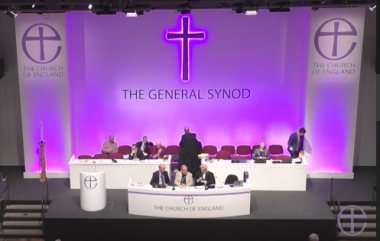A two-word argument against 'transgender liturgy'
As the furore continues about the Church of England's new 'gender transition services' the question will no doubt be asked by many: what's not to like about the idea?
After all, shouldn't churches welcome transgender people? Didn't Jesus come for everyone – especially those often marginalised or discriminated against? Shouldn't the message of the Christian faith be equally accessible to everyone?

And the answer to all those questions is, of course, 'Yes' and 'Amen'! But that doesn't necessarily make these proposals a good idea. There is a simple two-word reason why. And those two words are just these: 'The gospel'. It's the gospel itself which means we don't need special 'transgender transition services' as the CofE official website describes them.
Firstly, it is the gospel which provides everyone, whether 'LGBTQI', 'straight' or anything else, with the new identity we all need most. If anyone is in Christ – anyone – they are a new creation. The old has gone, the new has come. That's what the New Testament tells us. It is this identity we appropriately celebrate in Christian liturgy.
Secondly, it is the gospel which provides believers with new names. Emma Scrivener, writer of the award-winning blog 'A new name', writes: 'We are not who other people say we are. But also (and this is also good news), we're not even what we call ourselves. When we become Christians, Jesus gives us His name and His reputation.' It's worth reading her post in full if this is all new to you.
Thirdly, it is the gospel which gives everyone equal value. Thus there 'is neither Jew nor Gentile, neither slave nor free, nor is there male and female' (Galatians 3:28) – and we might add 'transgender or cisgender' (the latter term being the 'woke' word to describe those whose gender identity matches their sex assigned at birth) – 'for you are all one in Christ Jesus'. We shouldn't need extra rites to make sure some are truly valued. Rightly understood, the gospel itself does that.
The problem with the Church of England's plan is that it appears, I am sure unintentionally, to imply that the gospel alone is insufficient for trans people to be fully welcomed into the church. According to the official website, the proposal 'formally commends the incorporation of the existing rite for the Affirmation of Baptismal Faith into services which mark gender transition' – and encourages clergy to be 'creative'. But on that very same basis, why not have similar liturgies which 'involve the incorporation of the existing rite for the Affirmation of Baptismal Faith into services which mark'... a new nationality? ...Or a change of career? ...Or becoming a vegan?
The answer – of course – is that people with a new nationality or career, or who are becoming a vegan, or anything else under the sun, may indeed wish to be baptised or re-affirm their baptismal vows. But neither they, nor transgender people, need revamped liturgy – 'creative' or otherwise – to do that. They simply need to respond to the gospel. Perhaps the closest parallel in the Bible, albeit not exact, is the case of the Ethiopian eunuch (Acts 8: 26-40). He came to faith and was baptised at once. Pastorally, the apostle Philip appears to make no big deal of the fact that he is a eunuch; he simply welcomes him fully and completely into God's family.
You may ask, then, how would a transgender person turning up at one of the churches where I serve be treated? They would, I hope, be welcomed warmly, as we try to do for everyone. I would envisage calling them whatever they tell me their name is. Would they be given 'unconditional affirmation' as the House of Bishops suggests? Not necessarily – but then nor is anyone else for that matter.
The gospel challenges all of us to 'repent and believe' – not simply 'turn up and be affirmed'. What if a transgender person wished to reaffirm their baptismal vows, or indeed be baptised to start with? I'd be delighted! And I would undertake appropriate preparation and discussions with them as I would with anyone else. But they don't need anything extra by way of 'gender transition services'. The gospel – Christ – does it all!
I suspect that some of those involved with the preparation of this new proposal would say a hearty 'Amen' to pretty much everything I have written above. And my hunch is that some (if not all of them) thought that all they were doing was providing guidance about what to do if a transgender person wants to reaffirm their baptismal vows. But the CofE website says these are 'gender transition services' and states they are for people 'wanting to mark their gender transition'.
It is one thing to have a transgender person wanting to reaffirm (or make for the first time) baptismal vows in Christ. That's great! But it is a different matter altogether to offer something with the overt purpose of marking and affirming, apparently without question, gender reassignment surgery. Such surgery is something which is still being hotly debated in society among clinicians, experts and the public, not to mention the church. See the difference?
Why make life more complicated than it needs to be? The gospel is simple. Whether we are trans or not, Jesus is all we need. And all of us get the fullest of full welcomes into his church through repentance, faith in him and baptism. Full stop.
David Baker is a former daily newspaper journalist now working as an Anglican minister in Sussex, England. Find him on Twitter @Baker_David_A











